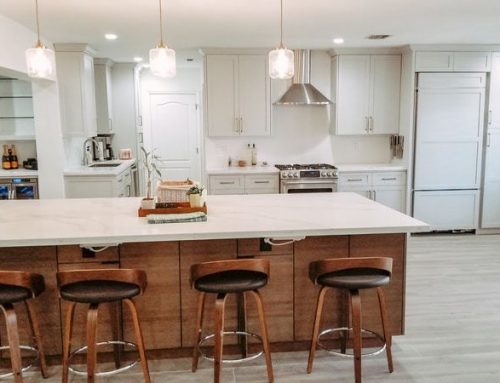Step 1: Who Should I Hire?
The first thing you need to analyze is the extent of the project that you plan on doing. If it is a small, specific project, such as refinishing cabinets or laying laminate flooring, you may be satisfied with the work of a handyman. If the project is more extensive, like creating a new layout for the kitchen, remodeling a bathroom, or removing a wall, you are better off hiring a licensed general contractor. When you are trying to create a more efficient layout of your home, you will also need an architect and possibly a designer. Some contractors have these professions on staff but if not, you want to make sure your contractor has experience working with both trades.
Once you have determined the type of tradesmen you need, it is time to begin researching. Friends, family, and work colleagues can all be good sources of personal recommendations. If you don’t know anyone who has recently completed a project, the internet is the next best source. Make sure you look at contractors’ websites, read reviews, and look for pictures of their completed projects. It may also be a good idea to search their name with keywords like “scam” or “rip-off” to make sure there are no red flags before you determine if they are the right contractor for you.
Step 2: Call Around
You’ve all heard the recommendation that you should get a minimum of 3 estimates, but there is no definitive number of contractors that you should call. Price should never be the only determining factor for choosing your contractor. Therefore, we recommend making contact with at least 4-6 contractors that you feel comfortable meeting in person.
During your conversations, you want to develop a good rapport and pay attention to how they answer your questions. Consider these key items:
- Do they answer the phone professionally?
- Do they speak to you respectfully?
- Do they seem genuinely interested in your project or does it sound like they’re too busy?
- Do they give direct answers to your questions?
- Do they let you speak without interrupting you?
It is also important that you address these specific questions:
- Are they licensed? Not all states have the same requirements for which type of work requires a license. Make sure you check your states requirements and check to see if the contractor’s license is current as well.
- Do they have insurance? If so, what type of coverage do they have?
- Have they completed similar projects before? Make sure you know the details of your project before you start making calls. What style do you want? Is the contractor familiar with the characteristics of that style? Can they handle a complex job that may involve installing beams and supporting the foundation?
- Do they have a list of references? Are they willing to give you contact information for past clients and vendors?
- When will they be able to start? Good contractors are often very busy. You want to make sure that they can work with your schedule and deliver the project in a timely manner.
- Do they have a detailed contract? It’s important that you both sign a contract with clear terms about work timeline, payment schedules, and dispute resolution.
Step 3: Meeting with Your Selected Contractors
Now that you have scheduled some in-person meetings with a few contractors, there are several additional questions you want to have answered:
- How long has the company been in business?
- What is their permanent business address? Don’t be alarmed if the address is residential – many contractors work from home.
- Are they licensed to work in your area? The contractor needs to be licensed through the state but they must also register with the county and each individual city in which they work.
- Are they insured? Ask them for proof of their insurance. Some HOA’s or condo associations will require that they are listed as an insurer, or policy rider, as well.
- Will your remodel require permits?
- How many similar projects have they completed in the past year? This demonstrates a familiarity with your needs and will help the project run smoothly.
- Can they provide you with a quote and detailed pricing? You want to make sure that the estimate has a detailed break down of what is included, as well as possible unforeseeable costs. This will allow you to compare apples to apples and make sure that your budget is sufficient to complete the job should unexpected costs arise.
- What is the payment schedule? When are payments made and are they flexible? Do the benchmarks seem fair?
- Are they willing to show you a project that they are currently working on? If so, take advantage of the opportunity. Take a look at how many people are working, are they focused on the tasks at hand, is the workspace kept clean and safe, etc. If the homeowner is home, ask if they are satisfied with the work that has already been completed.
The more information that you have about the home remodeling contractor, the process, and the project, the more likely you are to avoid the costly pitfalls of mistakenly hiring the wrong person. Although it can be tempting, it is never a good idea to hire a contractor strictly on price. The cheap can turn out expensive in the long run. Price is definitely important and it is necessary to stick to a budget. Make sure you have enough information to determine if your budget is realistic. This will protect you from bad contractors who may try to take advantage of you. There are still many great contractors out there who have your best interests in mind and would love to add you to their happy customer list.






Leave A Comment